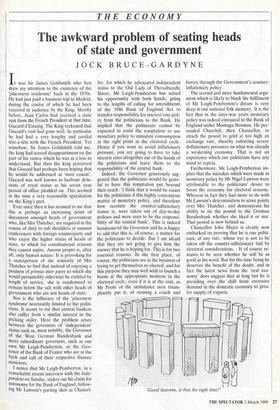THE ECONOMY
The awkward problem of seating heads of state and government
JOCK BRUCE-GARDYNE
It was Sir James Goldsmith who first drew my attention to the existence of the 'placement syndrome' back in the 1970s. He had just paid a business trip to Madrid, during the course of which he had been received in audience by the King. Shortly before, Juan Carlos had received a state visit from the French President at that time, Giscard d'Estaing. The King reckoned that Giscard's visit had gone well. In particular he had had a very lengthy and cordial t6te-A-tete with the French President. Yet somehow, Sir James Goldsmith told me, the king had sensed disappointment on the part of his visitor which he was at a loss to understand. But then the king perceived that Giscard had perhaps been hoping that he would be addressed as `mon cousin'. Giscard was well known to harbour delu- sions of royal status as his seven year period of office plodded on. This seemed at the time a very reasonable speculation on the King's part.
Ever since then it has seemed to me that this is perhaps an increasing point of discontent amongst heads of government who, like Mrs Thatcher, are required in the course of duty to rub shoulders at summit conferences with foreign counterparts and who enjoy the higher status of heads of state, to which for constitutional reasons they cannot aspire. Amour propre is, after all, only human nature. It is provoking for a statesperson of the seniority of Mrs Thatcher to find that instead of enjoying a Position of primus inter pares to which she would presumably otherwise be entitled by length of service, she is condemned to remain below the salt with other heads of government who are not heads of state.
Nor is the influence of the 'placement syndrome' necessarily limited to the politi- cians. It seems to me that central bankers also suffer from a similar interest in the Pecking order. Here the problem arises between the governors of 'independent' status such as, most notably, the Governor of the West German Bundesbank and more subordinate governors, such as our OW n Mr Leigh-Pemberton, or the Gov- ernor of the Bank of France who are at the beck and call of their respective finance ministers.
I notice that Mr Leigh-Pemberton, in a remarkable recent interview with the Inde- pendent on Sunday, stakes out his claim for autonomy for the Bank of England, follow- ing Mr Lawson's parting shot as Chancel-
lor, for which he advocated independent status to the Old Lady of Threadneedle Street, Mr Leigh-Pemberton has seized his opportunity with both hands, going to the lengths of calling for amendments of the 1946 Bank of England Act to transfer responsibility for interest rate poli- cy from the politicians to the Bank. He implied that the politicians cannot be expected to resist the temptation to use monetary policy to stimulate consumption at the right point in the electoral cycle. Hence if you want to avoid inflationary pressure, you are going to have to take interest rates altogether out of the hands of the politicians and leave them to the responsibility of the central bank.
Indeed, the Governor generously sug- gested that the politicians would be grate- ful to have this temptation put beyond their reach: 'I think that it would be easier for the politicians if this highly contentious matter of monetary policy, and therefore how resolute the counter-inflationary stance is, were taken out of day-to-day policies and were seen to be the responsi- bility of the central bank'. This is indeed handsomeof the Governor and he is happy to add that this is, of course, a matter for the politicians to decide. But I am afraid that they are not going to give him the answer that he is hoping for. This is for two essential reasons. In the first place, of course, the politicians are in the business of trying to get themselves re-elected, and for this purpose they may well wish to launch a boom at the appropriate moment in the electoral cycle, even if it is at the cost, as Mr Poole of the ambulance men trium- phantly put it, of running a coach and
horses through the Government's counter- inflationary policy.
The second and more fundamental argu- ment which is likely to block the fulfilment of Mr Leigh-Pemberton's dream is very deep in our national folk memory. It is the fact that in the inter-war years monetary policy was indeed entrusted to the Bank of England under Montagu Norman. He per- suaded Churchill, then Chancellor, to attach the pound to gold at too high an exchange rate, thereby enforcing severe deflationary pressures on what was already a weakening economy. That is not an experience which our politicians have any mind to repeat.
Furthermore, Mr Leigh-Pemberton im- plies that the mistakes which were made in monetary policy by Mr Nigel Lawson were attributable to the politicians' desire to boost the economy for electoral reasons. Whereas in fact they had more to do with Mr Lawson's determination to score points over Mrs Thatcher, and demonstrate his ability to tie the pound to the German Bundesbank whether she liked it or not. That period is now behind us.
Chancellor John Major is cleatly now embarked on proving that he is one politi- cian, at any rate, whose eye is not to be taken off the counter-inflationary ball by electoral considerations. . It of course re- mains to be seen . whether he will be as good as his word. But for the time being he deserves the benefit of the doubt, and in fact the latest news from the 'real eco- nomy' does suggest that at long last he is presiding over the shift from excessive demand in the domestic economy to grea- ter supp y of exports.
'Good heavens, is that the right time?'


























































 Previous page
Previous page